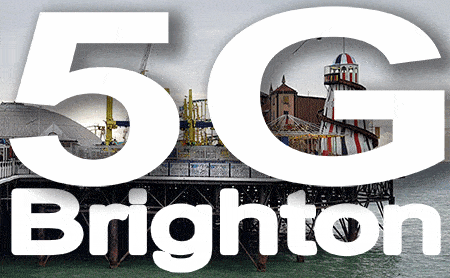In 2017, Which? magazine surveyed the 20 biggest urban areas in the country and found that Brighton had the slowest 4G download speeds at approximately 18 Mbps. That should be a strong incentive for Brighton to install 5G services, right? Well, things are not so clear cut.
When will Brighton get 5G and is it safe? Despite an early test run of 5G services, it’s still not obvious whether Brighton will get 5G services and yes, if and when 5G is implemented it will be safe. Let’s look at what’s going on, shall we?
What Is 5G And Why Does It Matter?
5G is the 5th generation of data transfer over mobile telephone networks. 1G was “analogue” and was the original platform for networks – it allowed for voice calls but no data services.
2G was the switch to digital, though it wasn’t referred to as “2G” at the time and it was originally also for voice transmission only.
There were two extensions of the 2G networks to allow for data transmission, which industry insiders refer to as 2.5G and 2.75G respectively, these were GPRS (General Packet Relay Service) and EDGE (Enhanced Data Rates for Global Evolution) but neither was very good and when the first smartphone, the Apple iPhone, was released it was clear that people would need a lot more bandwidth than 2G networks allowed for.
3G, the 3rd Generation, was the first generation of networks to carry the numerical “XG” tag and it was introduced in 2001 and it offered a theoretical maximum throughput of 3.1 Mbps.
However, in most cases, it never actually reached this kind of speed and it soon became clear that with the public’s evolving use of the Internet more speed would be needed.
4G, the 4th Generation, arrived in 2009 and offered a maximum throughput of up to 50 Mbps, though as the people of Brighton can attest to – again it rarely lived up to these promises.
When 4G was launched it was as fast as the average home broadband line of the time, but the last decade has seen ever-increasing demands for bandwidth.
In particular, streaming services and Software as a Service (SaaS) where software is used from the Internet via a mobile device are big bandwidth hogs. Businesses demand ever-faster Internet too and this leads us to 5G.
Introduced in 2018, 5G has a theoretical maximum throughput of 10 Gbit/s that is, it’s 20 times faster than 4G! That’s more than fast enough to stream any modern application, computer game or even high definition video.
So, What’s Brighton Doing About Implementing 5G?
In 2017, it appeared that Brighton & Hove would be one of the first places in the country to switch to the 5G standard.
In fact, so keen was the local authority to get on with implementing 5G that it announced a 5G testbed (a small site to test the technology) in May 2017.
The council reiterated its commitment to providing 5G services in Brighton in May of 2019. They broke their argument down into 3 main areas:
- Economic. Brighton is one of the top destinations for IT companies in the UK and is a strong player in the creative and digital fields too. They also acknowledged that Brighton’s residents want 5G services at home too.
- Following Guidelines. They reinforced the factual position that any 5G implementation in Brighton would follow national policy and would have no consequences for public health
- Legal Rules. They also noted that while Glastonbury Town Council has blocked 5G services, for the moment, that they are not bound by the same rules or required to make the same decisions.
No Consequences For Public Health?
Ah yes. We’re at the point where we turn to the second half of the question “Is it safe?” before we get to “when Brighton will get 5G?”
5G services, in order to achieve the bandwidth required by customers, operate in a new frequency spectrum that has not been previously used in mobile services.
This has led some members of the public to allege that 5G signals, which are a form of radiation, are going to cause mass outbreaks of cancer.
Cancer!?
Yes, that’s what they allege. The problem is that people also alleged that you would get cancer during the rollout of 3G services and when 4G services came along too. In both instances, there was no mass outbreak of cancer (and it would have been noted).
Now, back in 2011 the World Health Organization published a paper in The Lancet, which said that it was possible that using a smartphone might give you brain cancer.
The trouble with this paper is that in the following decade there has still been no explosion in the rate of brain cancer among the public.
Quite the contrary, in fact. Thus, there’s a feeling that those with concerns are overplaying their hand.
Many Things Are Possibly Bad For Us
However, it is also true to say that the frequencies that 5G networks operate in have not been tested widely on human beings. It is impossible to say that 5G services are 100% safe, but this is true for nearly everything that we do.
It is possible to die from falling out of bed, for example, but it is incredibly unlikely all the same.
This didn’t stop the Belgian Government from pulling a pilot project on their 5G network because of safety fears.
It is also worth noting that the WHO organization has also classified steaks, coffee, pickled vegetables, and a huge list of other items as “possibly carcinogenic”.
5G Is Probably Harmless
The majority of studies in this area of science conclude that radiation from mobile telephony services is harmless.
Though one peculiar study published in the NIEHS concluded that very high levels of 2G and 3G radiation gave rats cancer it also found that… the cancerous rats lived longer than the non-cancerous ones.
However, the simultaneously lucky and unlucky rodents can’t tell us very much about how safe 5G services would be in Brighton because the rats were blasted, over their whole bodies, for long periods of time with about 4 times as much radiation as you would get while using a smartphone.
So, yes, as far as we know, 5G services are safe for human beings and this is the scientific consensus.
Not So Good For The Environment?
Possibly, the strongest argument against 5G services is that they require a huge amount of equipment when compared to 4G services.
A 5G network uses a super high-frequency millimetre signal and it’s very weak when compared to a 4G signal. In fact, the signal can even be blocked by a leaf on a tree.
That means while a 4G signal can be broadcast from one transmitter for distances of several miles – 5G will need 5 times as many transmitters to affect the same level of signal coverage.
This is an argument that is proving to be more effective when it comes to slowing the rollout of 5G services than the health argument.
So, When Will Brighton Get Its 5G Service?
Like a Facebook relationship, the answer appears to be “it’s complicated”.
Despite the council affirming its commitment to 5G services in May of 2019, in November of 2019, the council blocked the deployment of the first three 5G telephone masts.
This makes Brighton & Hove the fourth town in England to ban 5G services but the first to do so on the grounds that the masts are “visual clutter” the others Totnes, Glastonbury and Frome have all used “safety” as their reason for blocking the rollout.
This has seen the local pressure group, Brighton and Hove 5G Radiation Free, claiming a victory even though the local authority has been clear that this is a ban based on aesthetics and not science.
So, what really brought about this change in attitude from the authorities? Well, we’d hazard a guess that the trigger was a meeting between local businesses and politicians in Shoreham on the 15th of October 2019 when the area Digital Strategy was agreed and signed off.
This should have paved the way for the rollout of 5G services in Brighton but instead, on the 16th of October, a petition was received by the council demanding they adopt the “precautionary principle” with respect to 5G rollout.
It is this petition that appears to have swayed the council’s decision-making process.
Conclusion
When will Brighton get 5G and is it safe? For the moment, Brighton’s 5G rollout plans appear to be on hold. It’s impossible for anyone to give you an accurate date until the local authority lifts the ban on masts.
Is it safe? Well, yes, according to all current data and scientific consensus, 5G services are safe for use and are unlikely to give anyone cancer.


